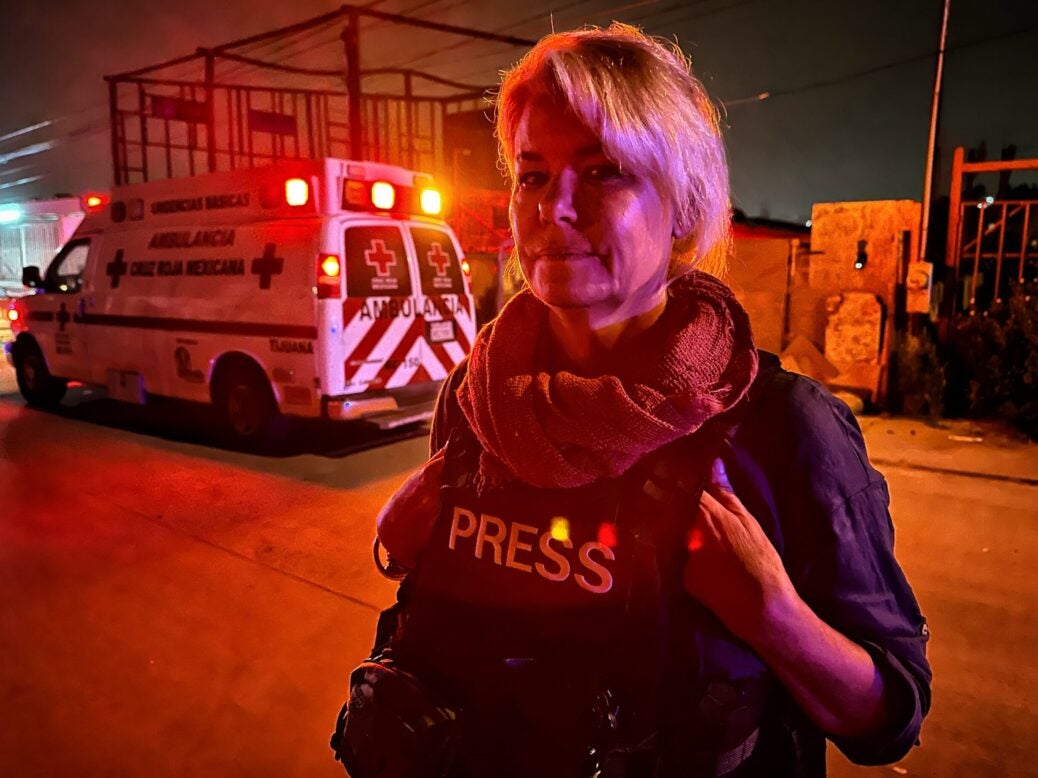
Almost 20 years after becoming a foreign correspondent, Alex Crawford‘s willingness to report from some of the world’s most dangerous places is unchanged.
“Has my appetite diminished? Unfortunately for my family, I don’t think it has,” the Sky News special correspondent says.
“I don’t see it as an appetite for danger. I see it as an appetite for good journalism and some of it has danger.”
She does recognise that the level of danger she will accept is “probably a little bit higher than most other people just because of their reaction to what I’m doing”.
“But it doesn’t feel unwieldy or overwhelming, and if it does reach that point then I usually stop.” Having a team, and strict Sky News safety and security policies, helps too, she adds.
Crawford has worked for the broadcaster since its launch in 1989 and first became a foreign correspondent in 2005, with postings in the likes of India, the UAE and South Africa.
The journalist, who is now based in Istanbul, met up with Press Gazette during a break in the UK in July – shortly after the release of her new documentary film, Women at War: Mexico.
She takes the opportunity to speak passionately about the value of journalism – and the fact the industry is “floundering” and being devalued.
“It’s the most important thing, probably because it should be deciphering truth from lies. It should be investigating injustice and telling people about things that are going right. How do we value it so little?”
Crawford says she is “not just blowing smoke up our arses” when she asserts that journalism is “fundamental to almost everything”.
“It’s more important than any government or any prime minister or any president because we’re meant to be independent and thoughtful and the moral conscience.
“And that sounds grand because it is fucking grand. That’s what we should be aspiring to be. We may not always be doing it right but that’s what we should be and that’s why it’s so important.
“And foreign journalism is important because you bring back and tell truths and say what’s going on on the ground with a bit of knowledge to people who might not have any of that knowledge.”
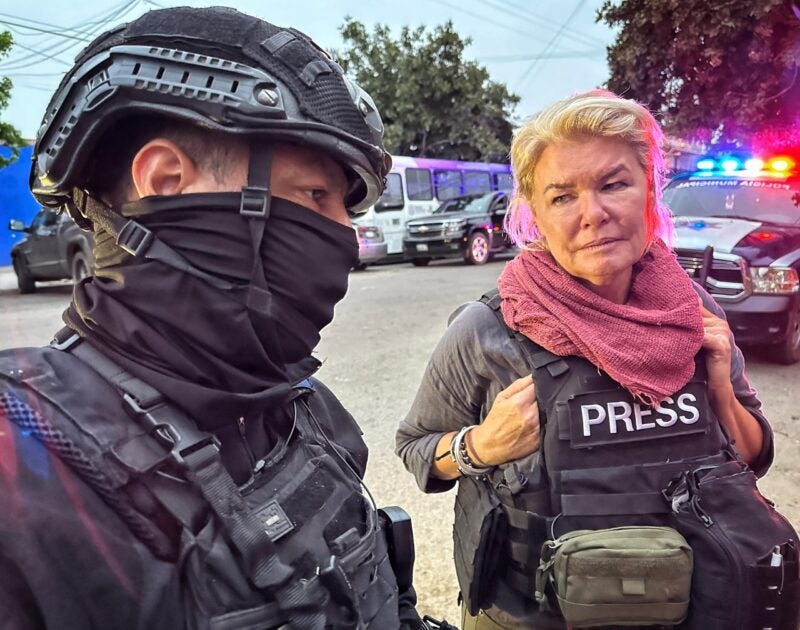
“Probably foreign journalism and any journalism is going to have an inherent risk with it, and you have to, in a way, be prepared for those risks because getting to the truth of things is going to be uncomfortable for lots of people, newsrooms, editors and governments,” Crawford adds.
“The whole Partygate thing – okay, Pippa Crerar and Paul Brand probably aren’t in a country where they’re going to be put in jail, but it must have been pretty uncomfortable for a bit for them because there’s reputational damage if you get it wrong, and even reputational damage if you get it right, with people just calling you this, that and the other, or tearing you down on social media.
“In foreign parts, when you’re reporting on anarchy or hostility, the risks are different and maybe higher, but they’ve got to be worth taking.”
‘We’ve got to value our own industry better’
However, those risks should be shouldered by trained journalists, Crawford believes. She is uncomfortable about the increase in people – including high-profile figures, like politicians or sportspeople – “masquerading” as journalists of all types.
She says it “shouldn’t be possible for someone to just decide one day” they are a journalist. “We’ve got to value our own industry a little bit better, otherwise there is no value in it.”
That distinction also counts for people who are eyewitnesses to an event or have an opinion on something that has happened.
“I don’t think as a matter of principle you should be taking whole stories and whole anything from people who aren’t journalists. Of course, maybe take it – having checked out what they’re saying is true – credit saying, ‘so-and-so who was close by and claims she saw this’, but… what is the point of all the rest of us doing hostile environment courses, journalist courses, anything of that ilk and you’re happy to take pictures from a war zone with no HR? You haven’t checked whether they’re safe. You haven’t checked whether they’ve got a flak jacket. You haven’t even checked their facts.”
The reason all this is increasingly important? Crawford says: “Unfortunately, we’re in an era where all the guys who don’t like journalists are winning the battle of convincing the general public that all journalists are one up from snakes – or actually the snakes – instead of the defenders of truth, and it really doesn’t help when you have people masquerading as journalists.”
She continues: “It’s been going that way for a while, and that’s on top of the sort of Trump, Boris Johnson era of downgrading journalists when it suits them and taking columns when it suits them. It’s downgraded the whole industry.
“And now we’re all fighting to prove that we’re honest, that we’re genuine, that we have no agenda. It’s just made it a lot harder for us, for everyone, I think.”
Crawford is a patron of the National Council for the Training of Journalists (NCTJ) and believes editors should remember why accredited training courses are so important.
“Otherwise, the industry will die, and it’s floundering right now, it’s really floundering.
“When I first started out, you couldn’t get a job as a journalist without an NCTJ certificate,” she adds. “And now I don’t know how much it’s worth, but it feels to me like it’s not worth very much if someone can just pick up a camera, take themselves off to Libya or Ukraine, send a few sexy pictures back and suddenly they’re a journalist.”
Alex Crawford says there is ‘appetite for good journalism’
Crawford is one of many of the world’s leading journalists who have been to Ukraine repeatedly since Russia launched its full-scale invasion in February 2022.
She has seen the landscape for journalists change from a “haphazard” and “anarchic” approach to one that is “very controlled” by press officers in the country – often former journalists themselves.
Ukraine is now doing “very well” at controlling both the message and journalists’ access. This is “extremely frustrating as a journalist because it just means you’re not quite sure – unless you can get to an area, you’re not quite sure what’s going on and what’s true and what’s not true,” Crawford says.
This has demonstrated how important it is to have accredited journalists with boots on the ground “investigating and checking things out and going to places and seeing it for yourselves and feeling it for yourselves and breathing it and talking to people – because otherwise, you’re going to get it wrong,” she adds.
Crawford admits she is “astonished” by the continuing level of interest in news and information from the war, which means the time and effort of rotating teams in and out of Ukraine is worth it.
“There’s an enormous hunger for what’s going on there. I think, judging by what does well and what doesn’t do well, they don’t just want bang, bang and people jumping in and out of armed vehicles, although there’s still an appetite for that.”
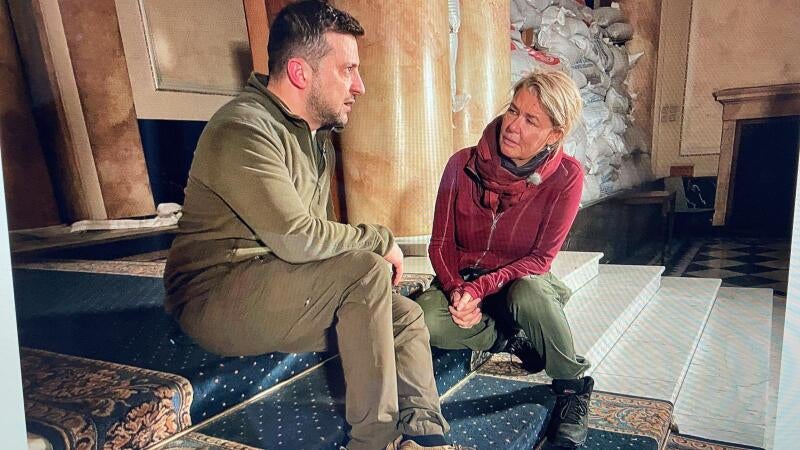
People are also interested, she explains, in reports like her investigation into what happened in the northern Ukrainian village of Yahidne, where almost the entire population was held captive in a school basement for 28 days near the start of Russia’s invasion.
According to Crawford, the high audience interest comes from all around the world, not just Europe. Her Women at War: Mexico film, which is currently available to watch on Sky On Demand, has also done “very well” online, she adds.
“I think there’s an appetite for good journalism generally. There’s obviously an appetite for gossip but that’s different to an appetite for really good journalism done well.
“There’s plenty of good journalists around, and because Ukraine has taken the focus of a lot of the world’s best journalists it does seem to follow that it gets the views.”
There is a “battle of the propagandas” in Ukraine, she says, between Russia and the West making independent journalism even more important.
“Somehow, in the middle of it, the journalists have to walk this narrow, dangerous path and try not to be brainwashed yourself. So, for instance, the idea of America sending cluster bombs should be appalling to absolutely everyone, including the journalists who are going to be on the side where they’re firing them and have been, like me, probably doing stories about how Russia has been using cluster bombs.”
Meeting inspirational people ‘keeps you going’
Crawford’s Women at War series of documentaries includes the recent Mexico film and a report last year on the plight of women in Afghanistan following the Taliban’s 2021 takeover. A third film will focus on Yazidi women in Syria and Iraq.
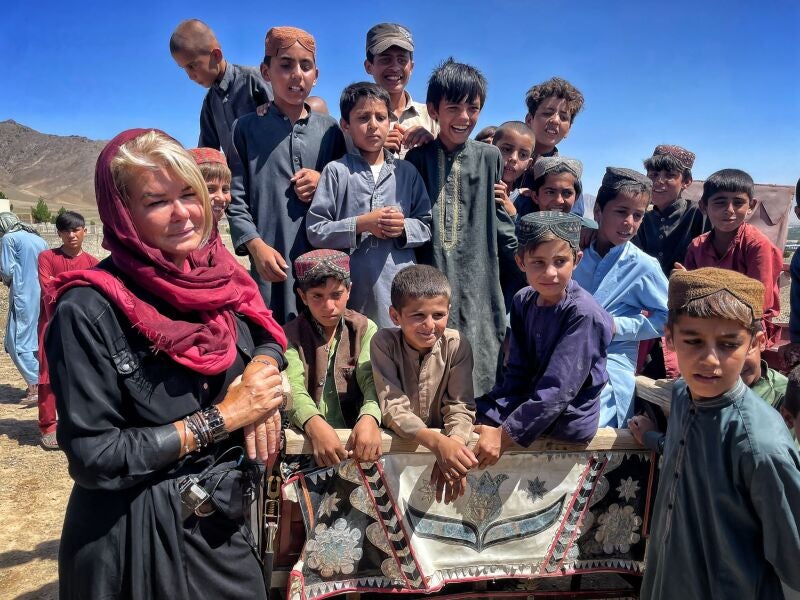
Crawford says she is “naturally drawn to stories about” women, often finding herself in conflict zones thinking: “How the hell are they coping? How the hell are they managing? How can they keep getting food in for their kids when there’s nothing around and shells landing all the time or why are they still here?” For example, she says, while in Ukraine, in her experience it was almost always women who organised the underground shelters.
She did wonder if focusing on women may “scare off” some of the potential audience – but says this has not turned out to be the case.
“I personally think they’re interesting and I think that’s the fundamentals of the story, isn’t it? You have to be interested and if you’re interested, you’ll probably make it interesting.”
Speaking about filming in Mexico, Crawford says she was particularly inspired by the first female mayor of Tijuana, the deadliest city in the country. They visited one of the city’s most dangerous areas together, with the Sky News team watched over by the National Guard – yet, Crawford says: “It felt like I was going on a tea outing with a mate.”
Crawford describes how she frequently meets inspirational people in her job: “That’s what keeps you going, I think, because you go into these absolutely dire situations and there are really horrible people but there’s also always people who are standout amazing, and who you cannot understand how they’re still so gentle and still so kind and considerate – and worried about you.”
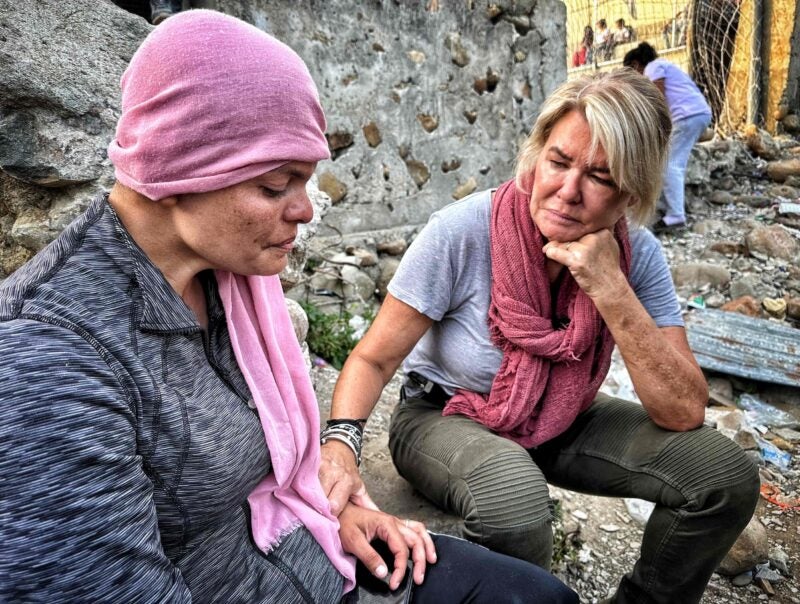
Diversity in journalism still ‘superficial’
In 2021, Crawford was given the Woman of the Year prize from Women in Journalism at Press Gazette’s British Journalism Awards. But she says that although it is always nice to be recognised: “I and along with some really stunningly good female journalists don’t need a special award. We’re fucking better than them anyway.”
She believes men think the pursuit for equality has succeeded – but she disagrees. “I think it’s still quite superficial. It’s not the same just having equal number of women and equal number of men. It’s equal number of opportunities.”
Crawford continues: “You’ve got to stop looking at people as men and women, for a start. You’ve just got to look at their work. And you’ve got to stop making judgments about the way people look, or what age they are, or whether they’ve got a penis or not. It really doesn’t matter as far as journalism is concerned. It’s just whether you can do the job.”
She also objects to the London bubble of journalism that disproportionately hires Oxford and Cambridge graduates. But, she says, people from different backgrounds should not be hired and then profiled once inside into only reporting on a certain subject.
“Don’t take on a black kid from northern England and then make them do gang stories all the time,” she says. “When I came back from maternity leave, my first 22 stories were all mother and baby stories. If I wasn’t a fucking expert then, I was an expert by the end of it. I can imagine how frustrated these guys are.”
“We need lots more diversity,” Crawford adds. “But diversity is much more than just statistics. And like I said about women, it’s about everything. It’s about opportunities. It’s about doing things that are a little bit outside the lines.”
Email pged@pressgazette.co.uk to point out mistakes, provide story tips or send in a letter for publication on our "Letters Page" blog
